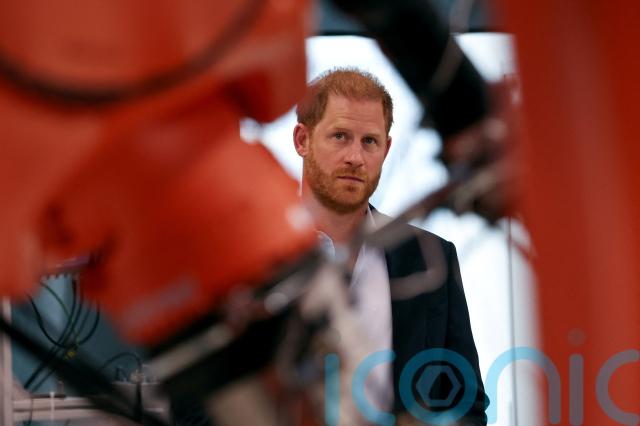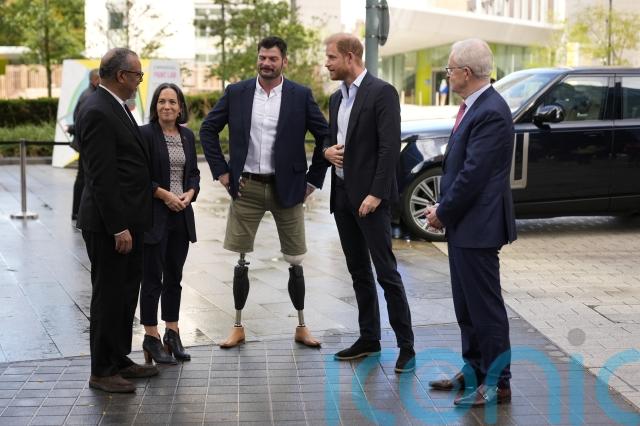
The Duke of Sussex has donated 500,000 US dollars (£369,000) to projects supporting injured children from Gaza and Ukraine.
The grants from Harry and the Duchess of Sussex’s charitable foundation, Archewell, will be used to help the World Health Organisation with medical evacuations, and also to fund work developing prosthetics for youngsters seriously hurt in the conflicts.
The announcement coincided with Harry’s visit to the Centre for Blast Injury Studies at Imperial College London on Wednesday – the third day of his four-day trip to the UK – where he heard more about its work focusing on injuries suffered by children and those sustained in natural disasters.
The duke, meanwhile, went on to reunite with his father, the King, for the first time in 19 months when they met for a private tea at Clarence House.

In a statement, Harry highlighted Gaza’s record number of child amputees and warned: “No single organisation can solve this alone.
“Gaza now has the highest density of child amputees in the world and in history.
“It takes partnerships across government, science, medicine, humanitarian response and advocacy to ensure children survive and can recover after blast injuries.”
During his tour, Harry was struck by a demonstration of the centre’s development of kits which can produce low cost external fixators used to treat bones which have been shattered by blasts or in natural disasters – including one that had been made in Gaza.

He was shown one from Gaza and told they were working to develop a 3D printed version.
After the tour of the research laboratories, Harry joined a roundtable discussion alongside representatives from Imperial, Save the Children, and the World Health Organisation (WHO) to discuss issues facing children in Gaza and beyond, with a particular focus on medical evacuation, mental health, and long-term rehabilitation, hearing from Save the Children staff who shared frontline experiences.
Harry told them: “Every time I return here, I’m struck by the commitment, innovation, and compassion that drives your work.
“From the labs I opened over a decade ago, to today’s focus on prosthetics for children, the progress and dedication are extraordinary. The voices we heard today remind us that behind every dataset is a child – a child in pain, in need of care, and deserving of a future.”
The three Archewell grants include 200,000 dollars (£145,600) for the WHO to support medical evacuations from Gaza to Jordan, 150,000 dollars (£111,700) for the Save the Children charity to provide ongoing humanitarian support in Gaza, and 150,000 dollars (£111,700) for the Centre of Blast Injury Studies to help its efforts to develop prostheses for injured children, particularly those children injured from the conflicts in Ukraine and Gaza.
It follows a £1.1 million personal donation made by Harry to BBC Children in Need on Tuesday.
Harry opened the Centre for Blast Injury Studies in 2013, which was the forerunner of Imperial’s new centre which was launched a few years ago on its White City campus.
Emily Mayhew, the paediatric blast injury lead at Imperial College London, told him: “We very much consider you part of our story.”
Harry was all smiles as he arrived at the centre in White City, west London, and was pictured with former Army captain David Henson, who served as Team GB captain for the inaugural Invictus Games, founded by the duke for wounded and sick military and veterans.
Mr Henson lost both his legs above the knee after standing on an improvised explosive device in 2011 while clearing a compound in Afghanistan. He went on to gain a PhD in Amputee Biomechanics at Imperial.
The duke was also joined by WHO chief, Tedros Adhanom Ghebreyes, for the tour and met with research teams working on a number of world-leading projects.
Mr Tedros said of Harry: “I’m really pleased about what he’s doing, especially for the children of Gaza.
“It’s not the money, it’s also the passion and commitment I think I see. And we have met a number of times and his commitment is very, very clear, and I really appreciate that.”
Among the research Harry was shown were new designs for prosthetic knee joints for children, a demonstration of the world’s most advanced foot and ankle physiological simulator, and the “gait lab” which uses a virtual environment with motion capture cameras and a treadmill to evaluate the impact of new prosthetic designs on patients.
“Here’s a good looking man,” Harry said with a big grin when he saw Steve Arnold who was demonstrating the gait lab equipment.
Arnold, who lost both his legs in an IED blast ion Afghanistan in 2011, was known to the duke after taking part in the 2014 and 2017 Invictus Games as a cyclist.
Subscribe or register today to discover more from DonegalLive.ie
Buy the e-paper of the Donegal Democrat, Donegal People's Press, Donegal Post and Inish Times here for instant access to Donegal's premier news titles.
Keep up with the latest news from Donegal with our daily newsletter featuring the most important stories of the day delivered to your inbox every evening at 5pm.